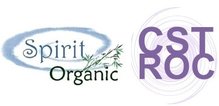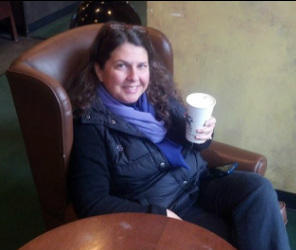 At a doula training with one one my granny role models, Whapio Diane Bartlett. Photo by Valarie Welsh
At a doula training with one one my granny role models, Whapio Diane Bartlett. Photo by Valarie Welsh I am a slow learner, it’s true. I needed twenty years to let go of the “helper” in me and embrace the “being”. I no longer believe that it is my job to make a good birth happen. I offer education, a prompt here and there, but mostly I offer the respect of watching my client have their own experience. I have been working with women trying to get pregnant, during pregnancy and postpartum all along, but I didn’t feel ready to be at births again until a couple of years ago.
I began attending births in 1991. I needed to go to a birth to become certified as an independent Bradley Method childbirth educator, and I was blessed with a dear friend who invited me to be present when she gave birth to her son. It was glorious: a vaginal breech birth with the midwife and obstetrician standing in the doorway while my mother/goddess friend did her thing. Her partner and I supported her, but she did it all, including standing on the delivery room table (narrow, metal, cold) with her head in the lights as she pushed her son into the world scrotum first. That was the first of many births I attended over six years.
A couple asked me a question last month that I had never been asked before: “Have you ever attended a birth where the mom took pain meds or had an epidural?” There was a long pause as I thought about it. I recalled the births: home births, hospital births, VBACs, with midwives, with OBs. None with medication. Then I said, with surprise in my voice, “No.” I told the couple I believe there is a place for medical interventions, including surgical procedures, epidurals and pain meds (hey, I had a C-Section), but they haven’t been used at any of the births I’ve attended so far.
One of the labors was traumatic. Not because of the birth itself, but because of how the mother was treated on admission to the hospital. The admitting nurse violated the mother’s privacy in a brutal way. The mother’s labor stalled and I finally left to let the couple regroup. She couldn’t relax in front of me after what I had witnessed. I was still very young as a doula. I had no idea how to address the situation. Now I have skills to turn that moment around, get her back into her own knowing and personal dignity. I know how to help us laugh it off.
At hospital births I saw other things happening that confounded me: routine monitoring, IVs and episiotomies; badgering and bullying the laboring woman while she tried to figure out how to push; managed third stage featuring pulling on the cord and punching down the woman’s stomach like it was bread dough. Why do we continue to allow care providers to bribe us with their “caring” in return for our compliance? (That’s the phrase medical providers use: “patient compliance”. More sensitive providers inform, then monitor for patient “adherence” to the suggested course of treatment, while allowing for deviation through informed refusal.)
Where did we lose our knowing of our physiological competence? I had no sense of my body’s wisdom before my own first birth. I tried to reach women before childbirth with puberty classes for girls and their moms, and reproductive wellness classes for adult women. I realized that I needed to learn more about how the body deals with trauma and how we heal from traumatic experiences if I wanted to be fully present for pregnant and laboring women. I had processed my own experiences and found great healing in my second birth, but there was more work to be done so I could be present and neutral no matter what was happening. I apprenticed as an herbalist. I studied homeopathy. I took Reiki classes. I heeded the call to become an extremely well-trained craniosacral therapist.
What laboring couples need is a calm, encouraging, birth-knowing extra body in the room (a chill gofer who happens to know a lot about birthin’ babies just in case a helpful piece of info is required), and I’ve taken time to learn how to do that. I’ve let go of feeling it is my job to “do stuff” to be worthy of being present.
I’ve acquired a ton of knowledge and many wonderful bodywork and listening skills, but nothing matters more than being a witness to the glory of the working birthing process, as I was for my friend at that first birth I attended.
I know that, given enough time and space, birth almost always works without intervention. However, many couples aren’t given that time and/or space for lots of good and bad reasons. I don’t have to be invested in the outcome, I’m just here to love what is. Like a granny does.


 RSS Feed
RSS Feed